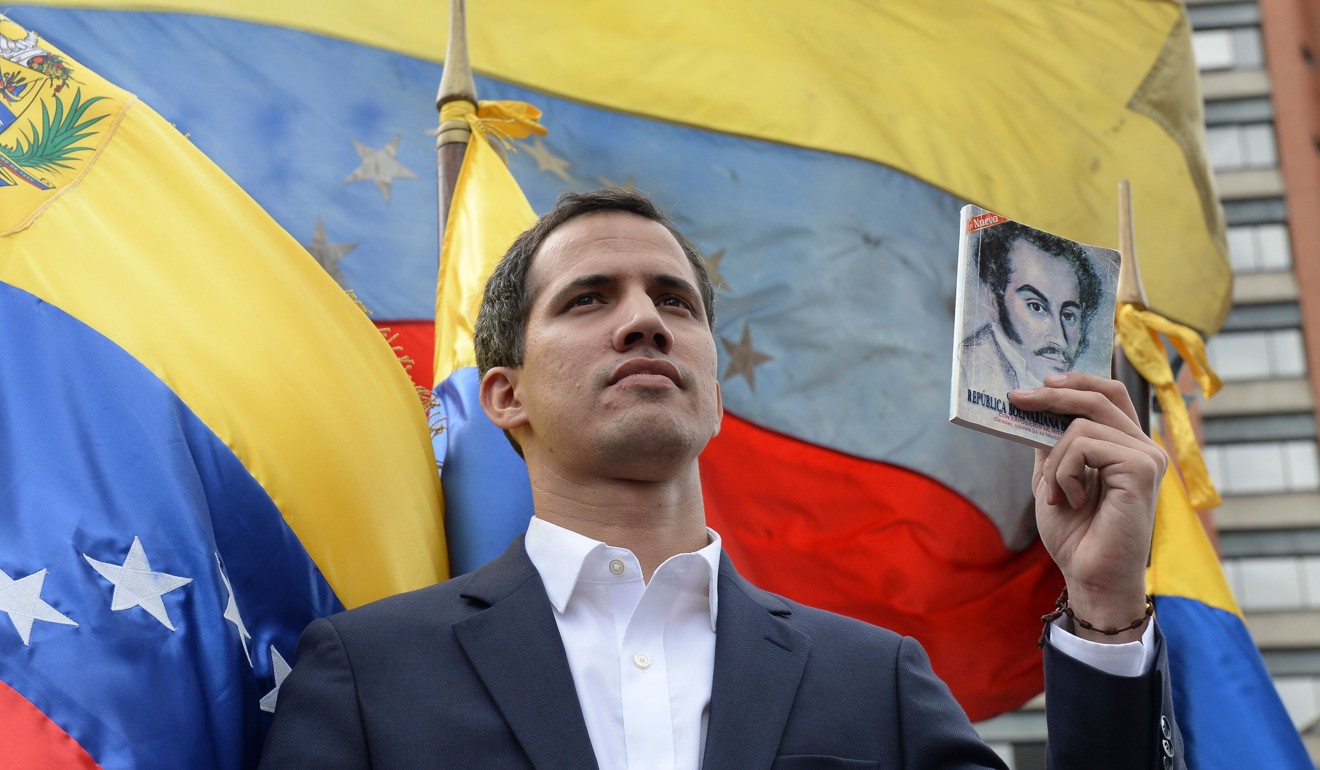
Wary China offers support to embattled Venezuelan President Nicolas Maduro
- Beijing calls for calm as it weighs prospects for its huge investments amid Caracas’ political turmoil
China voiced support for the increasingly isolated Venezuelan President Nicolas Maduro on Thursday as the Latin American country plunged deeper into turmoil over a diplomatic showdown with the United States.
As oil-rich Venezuela’s main ally and creditor, China faces a dilemma – caught between backing Maduro and not taking sides – as it weighs the implications of a growing social and political crisis on its multibillion-dollar investment, analysts said.
Chinese foreign ministry spokeswoman Hua Chunying called on “all parties to remain rational and keep calm, and reach a political settlement through peaceful dialogue”.
Asked directly if China recognised Maduro, Hua said Beijing sent representatives to his inauguration. “We respect Venezuela’s efforts to uphold its sovereignty, independence and stability,” she added.
“China opposes foreign forces from interfering into Venezuela affairs.”
Hua’s remarks came as Maduro broke off diplomatic ties with Washington after US President Donald Trump formally recognised opposition leader Juan Guaido as Venezuela’s interim head of state on Wednesday. Other countries in the region, including Canada, Brazil, Argentina, Chile, Columbia and Peru, also backed Guaido, the 35-year-old president of the National Assembly who had declared himself the country’s acting president.
Moscow, another key financial and military ally for Maduro, said it would continue to back the embattled leader, while the European Union called for “free and credible elections”.

Jiang Shixue, director of the Centre for Latin American Studies at Shanghai University, said Hua’s remarks showed Beijing stood behind Maduro, who assumed power in 2013 after the death of Hugo Chavez and continued an anti-American policy.
But it also showed Beijing’s deep concerns about the deepening crisis between Maduro and the Trump administration amid the trade war and tech rivalry between Beijing and Washington, he said.
“Despite Beijing’s criticism of Washington’s meddling, China is in a dilemma in Venezuela and it does not wish to take sides or intervene in its international affairs,” Jiang said.
Venezuela opposition leader Juan Guaido declares himself president and is recognised by Donald Trump, as pressure mounts on Nicolas Maduro
He said the tensions with the US and major regional players would make Maduro more desperate for China’s political backing, but Beijing had to weigh its options carefully.
Maduro is not likely to step down voluntarily but Beijing is worried about a possible regime change, especially the prospect of Guaido not honouring deals signed between China and Maduro’s government.
China has already loaned US$50 billion to Caracas over the last decade, which the South American nation has been repaying in oil shipments.
The US is threatening new sanctions on top of years of existing ones as Venezuela’s oil output has dropped to near 70-year lows.
During Maduro’s trip to Beijing in September, President Xi Jinping and other Chinese leaders promised to “provide whatever help it can offer” to cash-strapped Venezuela. Maduro also secured multiple deals with China worth “billions of dollars”, including another US$5 billion credit line.
Dong Jingsheng, deputy director of Peking University’s Latin America Research Centre, said China was keeping an uneasy eye out for a regime change in Venezuela because it was not clear how the crisis would play out.
Rival mass protests in Venezuela stoke political tensions after failed mutiny
But even if Maduro was forced out or stood down, “I expect some continuity in Venezuela’s economic and trade relations with China because China will remain one of Venezuela’s biggest markets for its oil”, Dong said.
Washington has repeatedly voiced its displeasure and concerns over Beijing’s close political and economic ties with Maduro.
But Dong said Beijing, which focused on forging close trade and investment ties with the region, had little stomach for the bigger military and security roles in Washington’s backyard that US politicians feared.
“China would not want to hurt its all-important ties with the US because of its economic and investment interests in Latin America,” he said.
Jiang and Dong urged Beijing and Chinese companies still operating in Venezuela to prepare for further chaos and unrest.
They said Hua’s remarks also signalled Beijing shared Moscow’s view that Venezuela’s political turmoil was another attempt by Washington to launch a “colour revolution” in the country.

